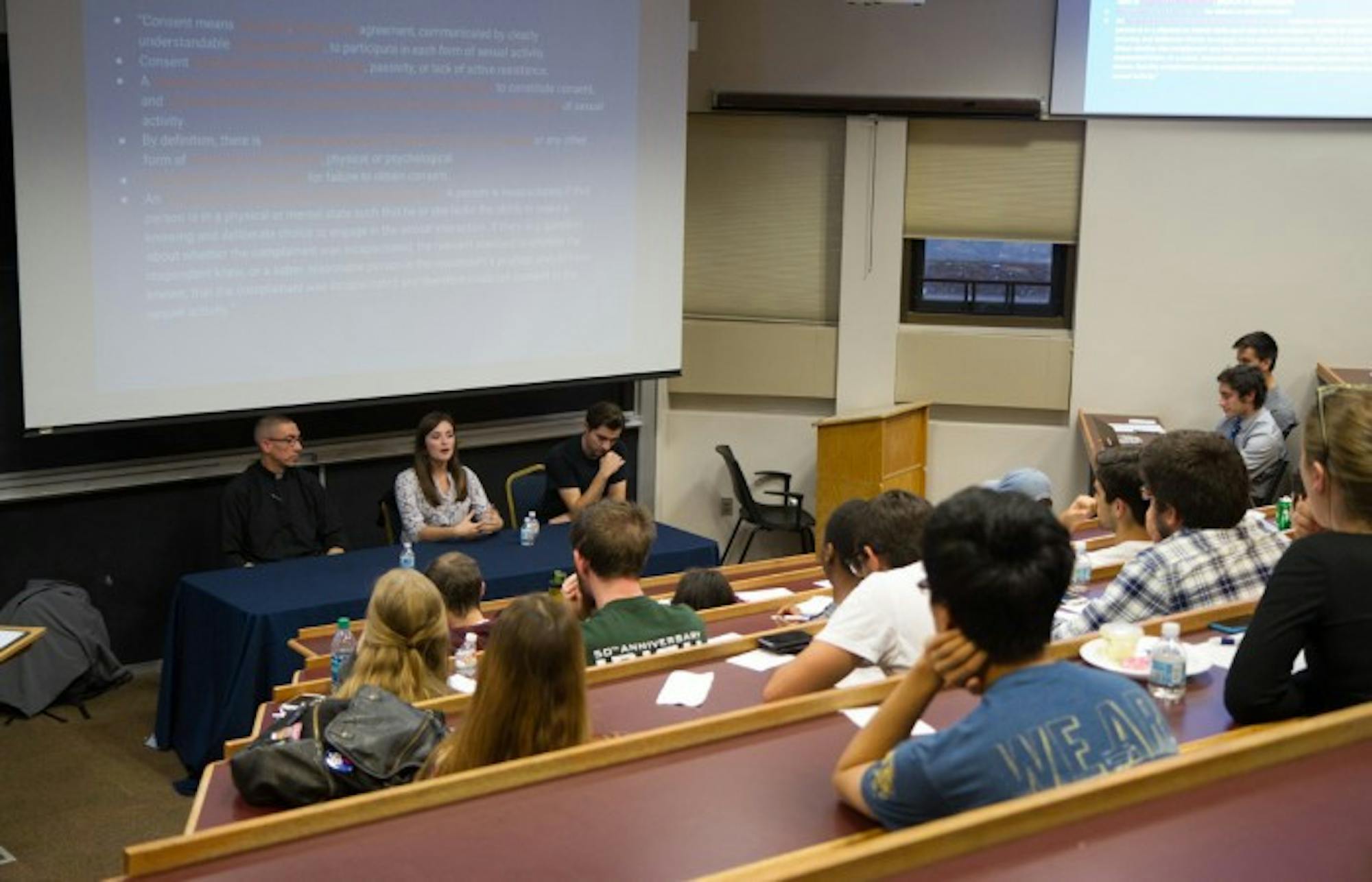Dorm parties are a cherished part of student life at Notre Dame, but the abusive drinking and negligence that can often accompany them lead to devastating results, Fr. Peter McCormick, director of campus ministry, said.
In an effort to spread awareness about sexual assault and promote conversations about alcohol, consent and dorm parties, the Gender Relations Center (GRC) sponsored a panel discussion Tuesday night at DeBartolo Hall. In addition to McCormick, the panel consisted of senior Annie Kuster, a GRC FIRE Starter, and junior Daniel Esparza, the president of Men Against Sexual Violence. Following the theme of “Let’s Talk about Hooking-up, Consent and Dorm Parties,” they answered questions directly from the moderator and anonymously submitted by the audience.

To frame the discussion, the panel began with a short video called “Tea Consent,” which provided a humorous perspective on the topic by using the act of serving someone tea as a metaphor for sexual consent.
The panel initiated their conversation by talking about the purpose of dorm parties and the consequences that on-campus parties entail.
Esparza said students often uses alcohol and parties as ways to release the stress of a long week, a mindset that can hold potentially damaging ramifications.
“It’s very important that people don’t use things like dorm parties and alcohol as a crutch,” Esparza said.
Because of the ubiquity of on-campus parties at Notre Dame and the strong connection between residence halls and social life, Kuster said students can sometimes be lulled into a false sense of security when they go to parties in dorms.
“We don’t necessarily connect going down the hallway with a place where some problem could be,” Kuster said.
McCormick said these thoughts are consistent with his experience as a rector. While Notre Dame has consciously preserved the culture of on-campus parties because it values making residence halls central to student's lives, he said the prevalence of alcohol on campus does involves some risks.
“If we want you to feel that the residence halls are home, you should be allowed to welcome your friends over, and you should be allowed to have parties,” McCormick said. “The mindset of why parties occur in dorms is very much rooted in the community mindset of Notre Dame."
The panel also discussed the differences in social life between men and women in college.
Kuster said boys have more power than girls over almost every aspect of a party, from the alcohol they provide to the music they play, because most parties are held in boys' dorms. Although this may seem like a trivial issue, Kuster said this means girls can feel more helpless in unfamiliar situations.
“When you show up to somebody else’s party and boys are the ones throwing the party, they have the control,” Kuster said.
However, McCormick said, girls have the ability to decide which parties to go to and can always leave when they feel uncomfortable.
“Woman actually have more power and authority than what they think,” McCormick said.
The panel then examined the question of why hook-ups and sexual assault seem to be so prevalent in college.
Esparza said many students enter college with naive ideas about how sex and relationships actually work, and consequently, can make mistakes without realizing their errors.
“Sometimes, especially in college, many people typically don’t see it as rape because they really don’t understand how mutual relationships work,” Esparza said.
Additionally, McCormick said the media portrays college far different from reality, with an emphasis on casual sex, drinking and partying. In particular, McCormick said, movies embody this myth and give incoming students major misconceptions about college.
“The thing Hollywood doesn’t show you, the thing popular literature doesn’t show you, is how it feels when an unwanted advance gets made on you,” McCormick said.
In order to break free from this ignorance, McCormick said students need to be actively involved in both learning about sexual assault and being mindful of their own actions.
“We need to be more informed ... about the fact that our actions, whether they be subtle, quick or even unintended, have significant impacts on people’s lives,” McCormick said.













